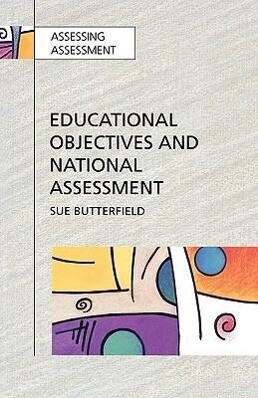
Zustellung: Sa, 26.07. - Do, 31.07.
Versand in 2 Wochen
VersandkostenfreiBestellen & in Filiale abholen:
Changes in assessment are at the heart of government policy for change in the UK. The GCSE, the National Curriculum and National Vocational Qualifications seek to make the progress of individuals more measurable - in order to make education professionals more accountable. These changes create a precarious balance - between the promise of better opportunity for students and a system of centralized control which could be stifling for teachers and learners alike.
This book takes an overall view of the technical claims made for improvements in assessment, alongside the policy agenda within which the changes are introduced. It highlights the dangers of taking a fragmented view - and allowing a competitive system and league tables to be based on information which may be technically shaky.
The alternative to mechanistic, objectives-driven models of control appear to be a reassertion of the professional role in education. However, arguments for professional power have to be carefully weighed against the need for learner empowerment.
This book takes an overall view of the technical claims made for improvements in assessment, alongside the policy agenda within which the changes are introduced. It highlights the dangers of taking a fragmented view - and allowing a competitive system and league tables to be based on information which may be technically shaky.
The alternative to mechanistic, objectives-driven models of control appear to be a reassertion of the professional role in education. However, arguments for professional power have to be carefully weighed against the need for learner empowerment.
Inhaltsverzeichnis
Introduction
Educational Objectives
The Political Context of Assessment
The General Certificate of Secondary Education, 1986
1993
The National Curriculum and Assessment
National Vocational Qualifications
The Contested Ground of Curriculum
The Objectives of Imposed Curricula: Dissemination, Meanings and Teachers' Work
Criterion
Referencing: Now You See It
Now You Don't
Issues in the Comparison of Performance
Educational Standards and Effectiveness
The Research Agenda
Against Fragmentation.
Educational Objectives
The Political Context of Assessment
The General Certificate of Secondary Education, 1986
1993
The National Curriculum and Assessment
National Vocational Qualifications
The Contested Ground of Curriculum
The Objectives of Imposed Curricula: Dissemination, Meanings and Teachers' Work
Criterion
Referencing: Now You See It
Now You Don't
Issues in the Comparison of Performance
Educational Standards and Effectiveness
The Research Agenda
Against Fragmentation.
Produktdetails
Erscheinungsdatum
01. Juni 1995
Sprache
englisch
Seitenanzahl
250
Autor/Autorin
Sue Butterfield, Butterfield
Verlag/Hersteller
Produktart
kartoniert
Gewicht
295 g
Größe (L/B/H)
216/140/13 mm
ISBN
9780335194186
Pressestimmen
"...insightful and thought-provoking, challenging readers'beliefs about educational practice." - Assessment in Education
Bewertungen
0 Bewertungen
Es wurden noch keine Bewertungen abgegeben. Schreiben Sie die erste Bewertung zu "Educational Objectives and National Assessment" und helfen Sie damit anderen bei der Kaufentscheidung.









